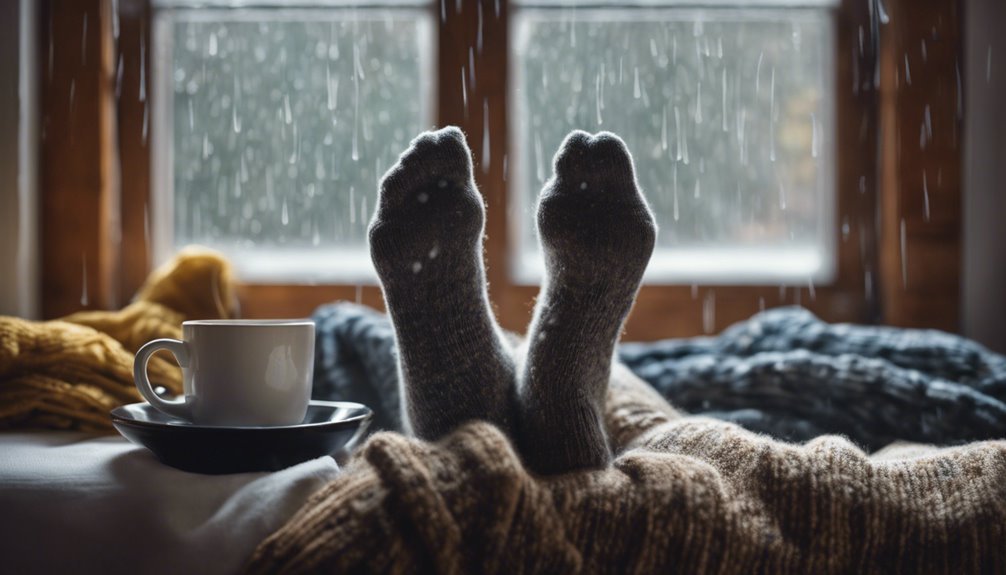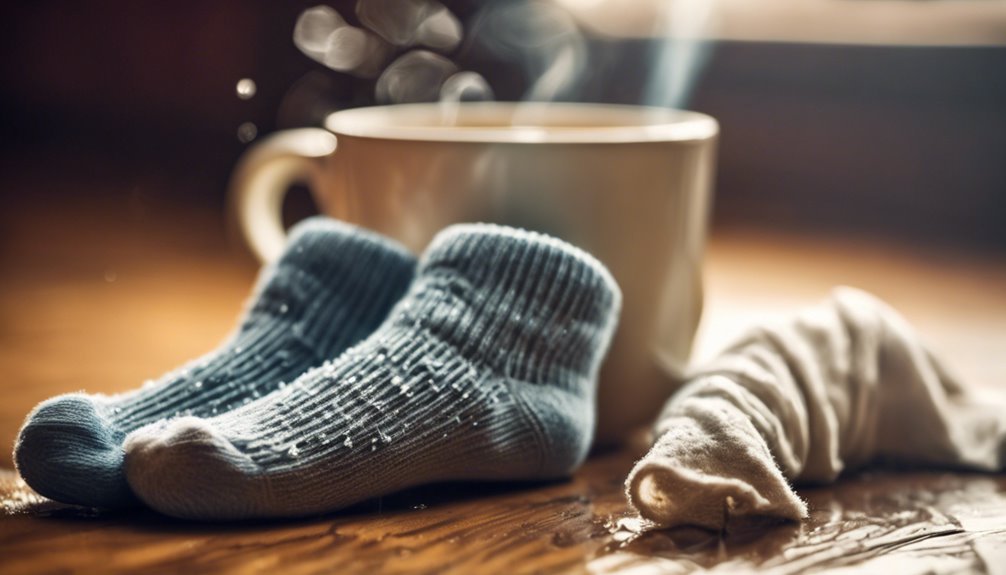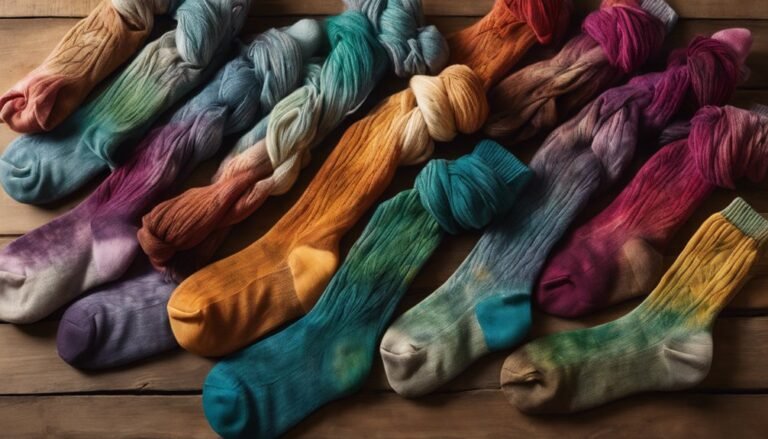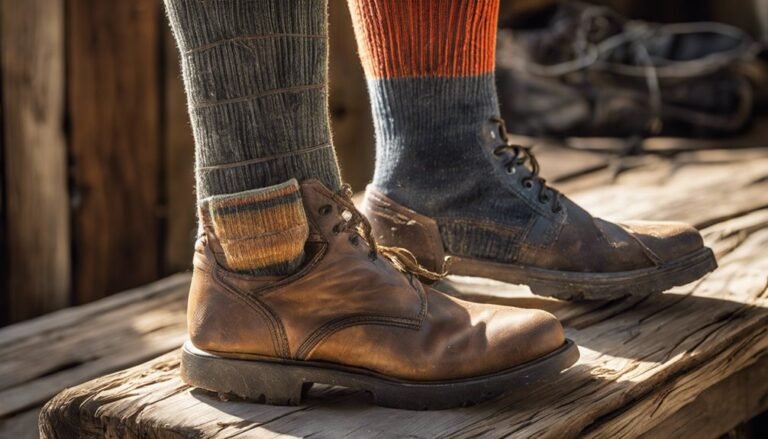Does Wearing Wet Socks Cure a Cold? Strange Remedy Explained
Wearing wet socks is a folk remedy believed to alleviate cold symptoms by enhancing circulation and stimulating the immune system. While some individuals report temporary relief, experts are divided on its effectiveness, and it lacks strong scientific backing. Risks include skin issues and potential worsening of symptoms if not done carefully. It's essential to stay hydrated and rest, while also considering alternative remedies. Learn about the origins, benefits, and expert opinions on this unusual method.
The Origins of the Wet Sock Remedy

The wet sock remedy has been around for over a century, gaining popularity as a folk remedy in various cultures. Rooted in historical practices, this approach reflects a blend of cultural beliefs about the body's relationship with nature. Many traditions maintain that exposing your feet to cold, wet socks can stimulate circulation and bolster your immune response. In some societies, this remedy was passed down through generations, often associated with seasonal illnesses. People believed that the shock of cold could help draw blood away from inflamed areas, promoting healing. While it may sound strange, the wet sock remedy serves as an indication of the creative ways cultures have sought to address common ailments, emphasizing the human desire for natural solutions to health challenges.
How the Body Responds to Cold Symptoms
When you catch a cold, your body mounts a series of responses to fight off the invading viruses. This immune response triggers various cold symptoms, which can be annoying but are signs your body is working hard to heal.
- Increased mucus production to trap and expel pathogens
- Inflammation in the nasal passages, causing congestion
- A rise in body temperature, leading to fever
- Fatigue as your body diverts energy to the immune system
- Sore throat due to irritation from post-nasal drip
These cold symptoms may feel uncomfortable, but they're your body's way of signaling that it's combating the illness. Understanding this process can empower you to manage your symptoms more effectively.
The Science Behind Wet Socks and Circulation
Although wet socks might seem like a minor inconvenience, they can greatly impact your circulation and overall comfort. When you wear wet socks, your body initially reacts by constricting blood vessels to preserve heat. This response can lead to a temporary decrease in blood flow. However, once you remove the wet socks and warm your feet, circulation improvement kicks in. The sudden warmth promotes increased blood flow to the extremities, which helps rejuvenate your body. This process can stimulate your immune system, potentially aiding your recovery from a cold. So, while it may sound odd, the science behind wet socks and circulation reveals a unique way your body can respond, enhancing recovery and overall well-being.
Anecdotal Evidence: Personal Stories of Relief

Many people have shared personal experiences highlighting the surprising relief from cold symptoms after using wet socks as a home remedy. These personal anecdotes often spark curiosity and encourage others to explore this unconventional approach. Here are some common themes from community experiences:
- Rapid decrease in congestion
- Improved sleep quality after application
- Unconventional yet enjoyable self-care ritual
- Enhanced overall warmth and comfort
- A sense of empowerment in managing symptoms
While scientific evidence may be limited, these stories illustrate how simple remedies can resonate within communities. If you're looking for alternative ways to alleviate discomfort, these wet sock experiences could inspire you to try something new and embrace a sense of freedom in your wellness journey.
The Potential Benefits of Cold Therapy
Exploring home remedies like wet socks can lead to a broader understanding of cold therapy and its potential benefits. Cold exposure benefits aren't just about discomfort; they can stimulate your body's immune response activation. When you subject your body to cold, it can trigger the release of white blood cells that help fight infections. This process may enhance your overall immunity, making you more resilient to colds and other ailments. Additionally, cold therapy may improve circulation and reduce inflammation, contributing to quicker recovery times. While wet socks may seem unconventional, they can serve as a practical application of these principles, allowing you to experience the invigorating effects of cold exposure in a controlled manner. Embracing such remedies could empower your health journey.
Risks and Precautions of Wearing Wet Socks
Wearing wet socks might seem like a harmless remedy, but it comes with potential health risks you should be aware of. Prolonged exposure to moisture can lead to skin issues and increase your susceptibility to illness. It's important to weigh these risks against the effectiveness of this method before you decide to try it.
Potential Health Risks
Although it might seem harmless, wearing wet socks can lead to several potential health risks that you should be aware of. Prolonged exposure to moisture can create an environment for bacteria and fungi to thrive, increasing your infection risk. Here are some health complications you might encounter:
- Fungal infections, like athlete's foot
- Bacterial infections, particularly in open wounds
- Skin irritations and rashes
- Cold or flu symptoms worsening due to lowered body temperature
- Hypothermia in extreme cases
While it's tempting to try unconventional remedies, it's vital to take these risks into account. You deserve to feel your best, so weigh the potential consequences before deciding to wear wet socks for any reason.
Effectiveness of Remedy
While some may advocate for the use of wet socks as a home remedy for colds, it's crucial to contemplate both the potential benefits and the associated risks. An effectiveness analysis suggests that while the practice might stimulate circulation and provide temporary relief, scientific backing is limited. You might find comfort in the warmth of dry socks afterward, but wearing wet ones can lead to discomfort or even worsening symptoms if you're already chilled. It's crucial to listen to your body; if you're feeling worse, stop immediately. Always consult a healthcare professional before trying unconventional remedies. Ultimately, while wet socks may seem harmless, they shouldn't replace proven methods for managing a cold. Choose wisely and prioritize your health!
Alternative Remedies for Cold Symptoms
When you catch a cold, exploring alternative remedies can offer some relief from your symptoms. Many people turn to home remedies and herbal treatments, which may provide benefits without the side effects of conventional medications. Understanding these options can help you manage your cold more effectively.
Home Remedies Overview
If you're looking for ways to alleviate cold symptoms without resorting to over-the-counter medications, home remedies can offer a variety of effective options. Many people turn to natural treatment options that boast home remedy effectiveness. Here are some popular remedies you might consider:
- Honey and lemon in warm water for soothing the throat
- Ginger tea to help reduce inflammation
- Steam inhalation for nasal congestion relief
- Saltwater gargle to ease throat irritation
- Chicken soup for hydration and nourishment
These remedies aren't just about comfort; they aim to support your body's natural healing process. Remember, while these options can be beneficial, it's always a good idea to consult with a healthcare professional if symptoms persist.
Herbal Treatments Benefits
Herbal treatments can be a powerful alternative for easing cold symptoms, offering a range of benefits that may enhance your recovery. By incorporating herbal teas and natural remedies into your routine, you might find relief from congestion, sore throats, and fatigue. For instance, chamomile and peppermint teas can soothe your throat and help you relax, while ginger tea may boost your immune system. Additionally, echinacea is known for its potential to shorten cold duration. These remedies not only provide comfort but also empower you to take charge of your health. Remember, while herbal treatments can be beneficial, it's important to consult with a healthcare professional to verify they're right for you. Enjoy the freedom to explore these natural options for your well-being!
Expert Opinions on the Efficacy of the Remedy
Although many people swear by the remedy of wearing wet socks to alleviate cold symptoms, expert opinions on its efficacy vary widely. Some medical perspectives suggest that while the practice might have a placebo effect, it doesn't directly target the virus causing your cold. Here are some expert insights on the matter:
- Cold exposure could potentially boost circulation.
- Wet socks may help reduce inflammation in the feet.
- The warmth of dry socks over wet ones can promote relaxation.
- Hydration and rest remain the most vital treatments for a cold.
- There's little scientific evidence supporting this method.
Ultimately, while it might provide temporary relief for some, it is important to rely on proven remedies for effective cold management.
When to Seek Medical Attention for a Cold

When should you consider seeking medical attention for a cold? If your cold symptoms persist beyond 10 days or worsen instead of improving, it's time for a medical evaluation. Pay attention to signs like a high fever, severe headache, shortness of breath, or chest pain, as these could indicate a more serious condition. If you experience swelling in your face or severe sinus pain, don't hesitate to consult a healthcare professional. Additionally, if you have chronic health issues, such as asthma or heart disease, you should seek advice sooner. Trust your instincts—if something feels off, getting a second opinion can provide peace of mind and guarantee your wellbeing. Remember, it's always better to be safe than sorry.
Final Thoughts on the Wet Sock Method
As you explore the wet sock method, it's crucial to understand its potential benefits and limitations. This unconventional approach may offer some cold symptom relief, but it's not a miracle cure. Here are a few wet sock benefits to take into account:
- Stimulates circulation: The cold socks can promote blood flow.
- Reduces inflammation: It may help alleviate sinus pressure.
- Encourages relaxation: The method can be soothing before bedtime.
- Supports immune function: Some believe it boosts your body's defenses.
- Natural remedy: It's a drug-free option for those seeking alternatives.
While the wet sock method might provide temporary relief, it's vital to complement it with proper rest and hydration. Remember, it's always wise to consult a healthcare professional for persistent symptoms.
Frequently Asked Questions
Can Wet Socks Be Harmful in Certain Situations?
Yes, wet socks can be harmful in certain situations. You should take wet sock precautions to avoid potential health risks like hypothermia or skin infections, especially if you're already feeling unwell or exposed to cold temperatures.
How Long Should I Wear Wet Socks for Relief?
Wearing wet socks for relief, like in a study where participants wore cotton socks, showed ideal duration of about 30 minutes. Cotton's breathability helps, but be cautious; prolonged exposure can lead to discomfort or skin issues.
Are There Any Age Restrictions for This Remedy?
There aren't strict age restrictions for this remedy, but child safety is essential. Younger children might be more sensitive to wet socks, so consider age factors and monitor their comfort and wellbeing closely during use.
Is It Safe to Combine Wet Socks With Other Treatments?
Ah, the classic wet socks debate! While combining remedies might sound revolutionary, you'll find wet socks' effectiveness isn't scientifically backed. Always consult a healthcare professional before mixing treatments; sometimes, freedom means choosing safer paths to wellness.
What Should I Do if I Feel Worse After Using This Method?
If you feel worse post-treatment, prioritize rest and hydration. Consider consulting a healthcare professional to discuss your symptoms. Alternative remedies can also be explored, but make certain they align with your body's needs and preferences.







